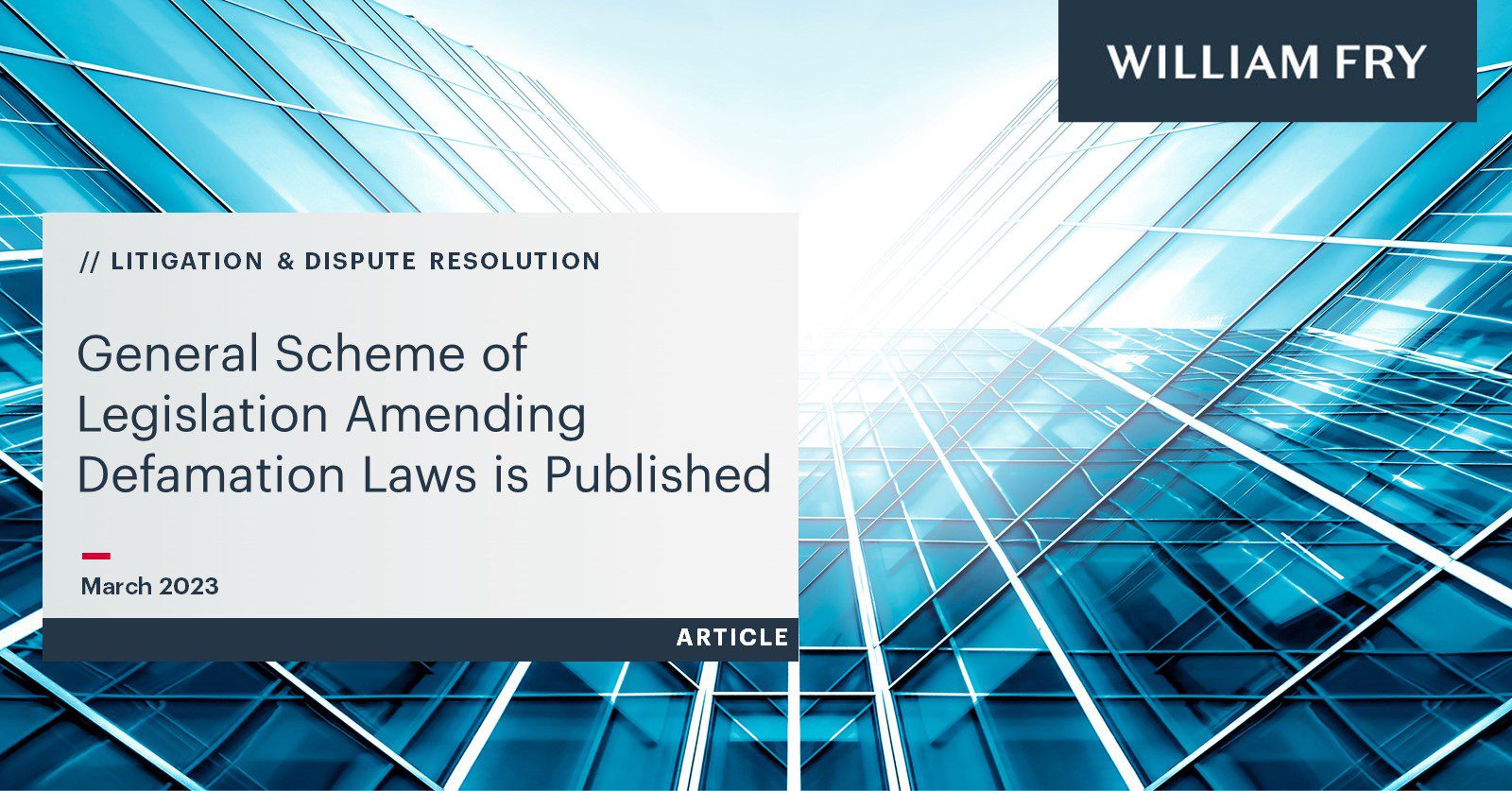The General Scheme of the Defamation (Amendment) Bill (General Scheme) has been published.
Taking into account recommendations made in the statutory Report of the Review of the Defamation Act 2009 (Statutory Review), the General Scheme proposes significant amendments to the Defamation Act 2009. You can read our previous article on the Statutory Review here. We look at some of the proposed amendments set out in the General Scheme in this article.
Abolition of juries
The General Scheme proposes to remove juries from High Court defamation actions. In Circuit Court defamation actions, there are no jury hearings. This was a key focus in the Statutory Review.
Strategic Lawsuit Against Public Participation (SLAPP)
As explained in the General Scheme explanatory notes (Explanatory Notes), SLAPP refers to the strategic and abusive use of vexatious litigation by a powerful entity or individual to weaken, deter and prevent reporting and discussion on matters of public interest.
The General Scheme proposes to provide an “anti-SLAPP” mechanism to allow a person to apply to court for summary dismissal of defamation proceedings that they believe constitute a SLAPP. The General Scheme also proposes to allow a defendant to apply for one of both of the following:
- early dismissal of SLAPP proceedings, before extensive costs are incurred,
- after a full hearing, remedies including dismissal of the proceedings, and a declaration that the proceedings constitute a SLAPP.
The General Scheme proposes to allow a court to make an order for security for costs in SLAPP proceedings.
The General Scheme purports to empower a court, where it is satisfied that the proceedings constitute a SLAPP, to order the plaintiff to bear all the defendant’s costs and award damages to the defendant for harm suffered.
Transient retail defamation
The General Scheme proposes the introduction of a serious harm test for “transient retail defamation”. This is defined as defamation arising from a statement in non-permanent form made during the provision or refusal to provide retail services. The General Scheme currently proposes that it is not defamatory for a retailer to ask a customer to produce evidence of payment when the customer is leaving the premises or for a retailer to inform a customer that the retailer is unable to accept the payment proffered where the retailer has a reasonable doubt that the cash or electronic payment is valid.
New serious harm test for bodies corporate
The General Scheme intends to require bodies corporate that trade for profit to show that the allegedly defamatory statement has, or is likely to cause serious financial loss before they can sue for defamation of its reputation.
Defence of “honest opinion”
The General Scheme proposes to amend the first limb of the test for the defence of “honest opinion” by replacing the requirement to show that “the defendant believed in the truth of the opinion or, where the defendant is not the author of the opinion, believed that the author believed it to be true” with the requirement to show that “the defendant genuinely held the opinion or, believed that the author genuinely held the opinion”.
Defence of “fair and reasonable publication on a matter of public interest”
The Explanatory Notes acknowledge that although the defence of “fair and reasonable publication on a matter of public interest” was intended to provide an effective defence to defamation claims, it has little impact. The General Scheme proposes to simplify and clarify the requirements of the defence, while ensuring the protection of the right to freedom of expression and the recognition of the importance of reporting on matters of public interest.
Forum shopping
To deal with the risk of forum-shopping, in respect of cases not falling under the Lugano Convention and the Brussel I Recast Regulation, under the General Scheme a court will have to be satisfied that Ireland is “clearly the most appropriate place” for the defamation action to be brought.
Automatic dismissal for want of prosecution
The General Scheme proposes to provide for the automatic dismissal of cases where the plaintiff has taken no step within two years of initiating the defamation proceedings.
Settlement offers
Like personal injuries proceedings, the General Scheme proposes to allow parties to lodge a formal offer of settlement in court, which must be taken into consideration by the judge when deciding costs.
Damages awards
The General Scheme proposes to add the following to the list of matters that a court shall have regard to when assessing damages:
- the value of money;
- the source/origin of the statement/identity of the parties;
- the relationship between and the status of the parties;
- the extent of the intrusion into one’s personal, business, professional or social life, or any combination thereof;
- the effect on the plaintiff; and
- the conduct of the defendant (other than the conduct of the defence).
The General Scheme also clarifies the situations where aggravated damages can be awarded.
Offer to make amends and correction order
The General Scheme proposes to amend the form of an offer to make amends. Instead of publishing a correction and apology “in such manner as is reasonable and practicable in the circumstances”, the correction and apology should be published with equal prominence to the original defamatory statement.
The General Scheme also proposes that to defeat an of offer of amends as a defence, the plaintiff must prove that the defendant acted recklessly.
Obligations on solicitors and parties
The General Scheme proposes to impose an obligation on solicitors to advise clients of the role of the Press Council and alternative dispute resolution (ADR). Under the General Scheme, in awarding costs, a court may take into account a party’s unreasonable refusal, failure to consider, or attend ADR processes.
“Innocent publication” and website operators
The General Scheme proposes to extend the defence of “innocent publication” to website operators for statements posted by a person over whom the operator has no effective control. This is conditional on the operator having appropriate mechanisms in place to prevent the defamatory posting and on the basis that those mechanisms could not have prevented the posting. The wording will be developed in consultation with the Attorney General’s office.
The extension is intended to capture owners or administrators of non-commercial community websites or social media accounts such as those established by parents of a local school, members of a local sports club or residents’ associations.
Circuit Court jurisdiction to make Norwich Pharmacal order
The General Scheme proposes to extend the jurisdiction to grant Norwich Pharmacal Orders (NPOs) to the Circuit Court. Currently, only the High Court can grant NPOs. The proposal aims to reduce the costs involved for plaintiffs.
Notice of Complaints process for online publications
The General Scheme proposes the introduction of a Notice of Complaints process, under which a person who believes that a defamatory statement about them has been published online may submit a notice to the intermediary service provider (ISP). The ISP must then forward any responses submitted by the complainant to the author of the statement within the prescribed time limits. The Notice of Complaints process aims to incentivise parties to make contact at an early stage by using the intermediary and to promote early resolution without recourse to litigation.
Conclusion
The publication of the General Scheme is an important step in reforming Irish defamation laws to bring them in line with other jurisdictions. In particular, the General Scheme seeks to reduce the risk of unpredictable awards in the High Court; reduce legal costs; address online defamation and promote the use of ADR in defamation. The government has approved the priority drafting of the amending legislation (Bill). The General Scheme will now be referred to the Joint Oireachtas Committee on Justice for pre-legislative scrutiny. We understand the Bill will be brought before the Dáil by the end of the year.
To discuss the impact of the General Scheme further, please contact Paul Convery, Adele Hall or your usual William Fry contact.
Contributed by Orla Trant



